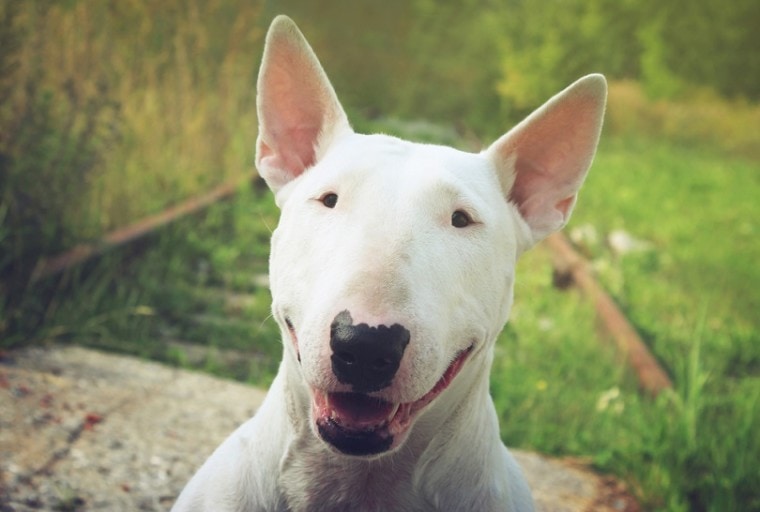
Click Below to Skip Ahead
You’ve seen this strange-looking dog before, and you might have wondered what in the world is it? These long-faced dogs are the Bull Terrier, and they hail from England. Around 1835, someone crossed an English Terrier with a Bulldog and got a Bull Terrier. Through the years, this hybrid has produced a tough white dog.
Breed Overview
Height:
21–22 inches
Weight:
50–70 pounds
Lifespan:
12–13 years
Colors:
White, brindle & white, tri-color, fawn & white, red & white, white & black brindle
Suitable for:
Active families with older children, those looking for a friendly dog
Temperament:
Stubborn, active, protective, sweet-natured
That toughness was built into this breed; however, they are still sweet dogs. These dogs have a history of being ferocious gladiators in blood sports, like bullfighting. Once that was outlawed, they became dogfighters, but once again the law caught up to them.
By the mid-1800s these dogs became a fashion icon for gentlemen rather than fighting dogs. They are strong, independent, and energetic, and they are more than capable of being the loving dog for your family.
Bull Terriers Characteristics
Bull Terrier Puppies
If you’ve ever fallen in love with the long-faced breed, then you might be tempted to jump headfirst into the deep end of the pool. Before you do that, you need to know that while this dog is very affectionate, they can often forget their own strength. Thankfully, despite their history, they are not on the list of dogs that are known to be biters. While all dogs can bite, they don’t nip when they play.
These dogs have a high energy level and are stubborn as they come. They are going to do what they want to do when they want to do it. You can thank their Bulldog lineage for that one. You’ll have to be able to handle a stubborn dog that just wants to make your life more interesting.
Now, these dogs do need to be entertained. If they aren’t their go-to is to get destructive. With many breeds, a bored dog is a destructive dog. Your house becomes their toy, and no one wants that. Since they often forget how strong they are, the damage can be extensive.

Temperament & Intelligence of the Bull Terrier
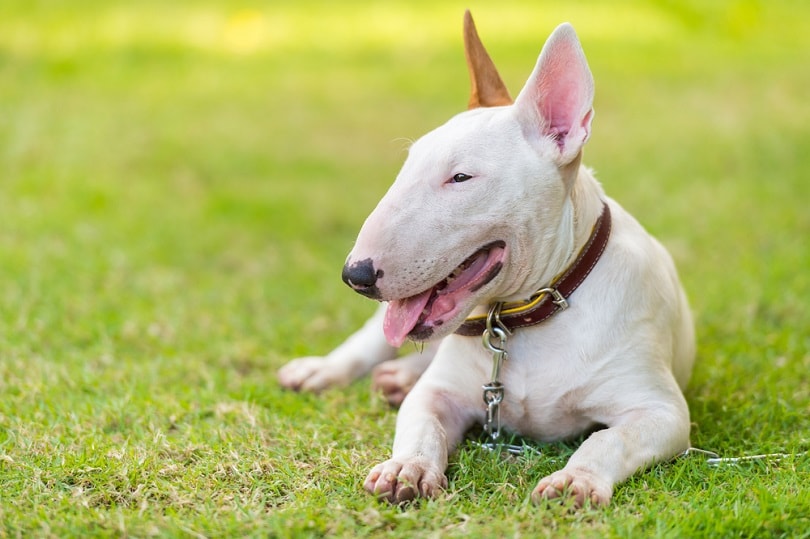
It would be unfair to say that these dogs don’t have some form of temperament as puppies. If that isn’t trained out of them, the temperament will show as a defensive behavior. Considering the reputation of the blood sports from their past, many would say that these dogs are aggressive. The truth is, these dogs have a pretty relaxed temperament around those they love and trust.
Now, while they are a smart breed, there is one thing that they always forget: strength—these are stocky dogs of muscle. They can easily win a game of tug-of-war without trying, and good luck getting that stick back if you haven’t trained them to drop it yet. They just often forget just how powerful they are because they love people so much.
Are These Dogs Good for Families? 👪
Yes and no. These dogs are super friendly, even to strangers, and they just love about everyone they come in contact with. Despite that love, though, they need an owner who can stand firm on training and keep their Bull Terrier in check. While these dogs are kid-friendly, they are well around older children who already know how to respect a dog’s space. Toddlers and babies are typically a no-go unless the dog is raised with them.
It isn’t because they are aggressive; it is mostly because they get far too excited during playtime and could accidentally hurt a younger kid. With any dog, supervision is a must. Bull Terriers can easily knock over a toddler or even grandma because they get so excited to see them.
Does This Breed Get Along With Other Pets?
Again, this is really going to depend on how socializing went. If they are socialized early on then yes, they can get along with other pets. Although, they have a tendency to overpower smaller pets because they forget they are built like the Hulk. Cats and rodents are a maybe for this dog. This breed has a high prey drive, and if a cat runs away, it will likely get chased. It is a balancing act of how each animal will get along with the other, and there are no promises that they will get along at all.
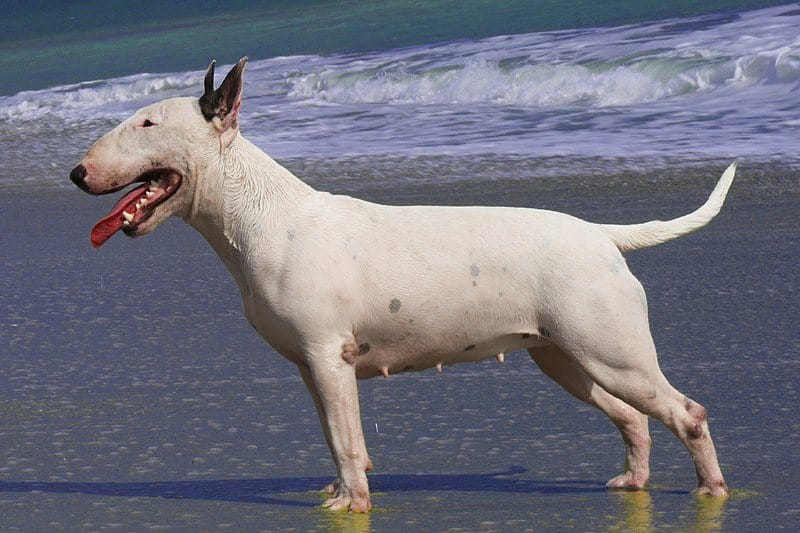
Things to Know When Owning a Bull Terrier:
For a medium-sized dog, the Bull Terrier comes with commitments you must make. Training, socializing, and not letting your dog walk all over you are a must. We’ve outlined the essential information to make an informed decision if the Bull Terrier is the right dog for you.
Food & Diet Requirements 🦴
Your dog is going to need a diet that matches its energy levels. The best way to do that is to talk to your veterinarian about what kind of dog food is best suited for your pet. Most times, a high protein diet with meat from either commercial dog foods or homemade will suit your dog. Always look out for quality and go with the highest quality you can afford for your dog.
Like many shorter-stature dogs, they are prone to obesity. They can pack on the pounds easily as they love food, so you have to be cautious to not feed your Bull Terrier too much.
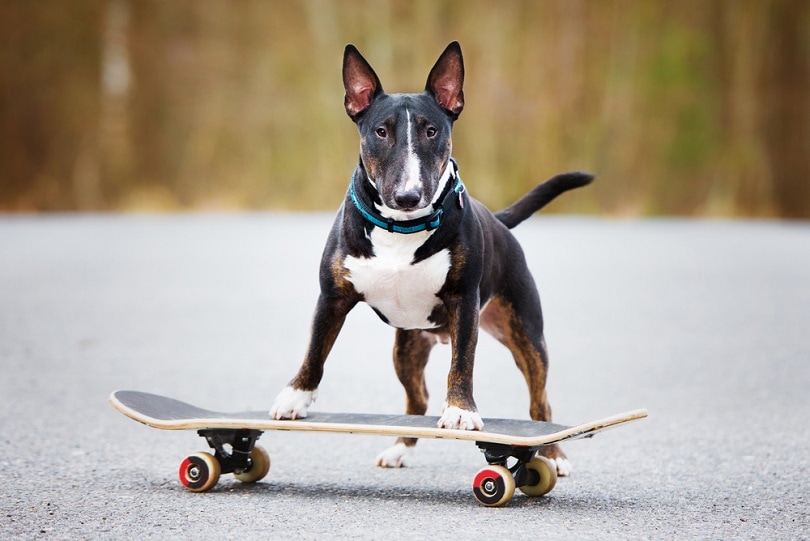
Exercise 🐕
On a scale of couch potato to nonstop energy, the Bull Terrier is closer to the nonstop energy aspect. They need plenty of exercise to be healthy. Not only do they need physical exercise, but they need mental exercise as well. This is one reason Bull Terriers excel in competitive sports—working their brain and their body. If sports aren’t your thing, then long walks, playtime in the backyard or just dog parks are a great way to get their energy out.
They are dogs that enjoy being outside; however, they don’t like extreme heat or cold. If your family enjoys hiking, running, or just overall being active, then this breed could be a great fit for you and your family.
Training 🎾
Training is a must with this breed. There is no getting around the fact that if you don’t train a Bull Terrier, they can be a dog that won’t listen to you or anyone. Bull Terriers are right on up there with the most stubborn of dogs, which means be prepared for that. They want to learn, and they want to please you, but they are independent by nature because of their history. This dog needed to be independent since they were around bulls.
With this breed of dog, they love working. Building a routine is great as it builds trust, and they will know what to expect from you. Since they can be sensitive, using positive reinforcement and gentle reprimands is necessary to build a lasting relationship.
Grooming ✂️
Bull Terriers are seasonal shedders. Weekly brushings are a must to keep on top of any skin issues and also to get rid of dirt and loose hair. During this time, you can get your dog used to having their ears and feet touched as those are sensitive areas. Staying on top of grooming will keep the shed down around your home, but also, you’ll also know if your dog develops any skin conditions.
Since this breed is susceptible to some skin conditions, it is important to monitor it.
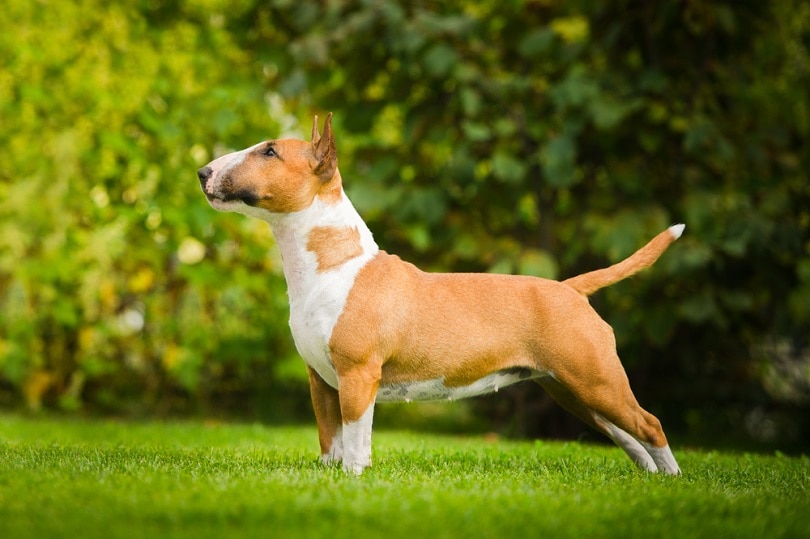
Health and Conditions 🏥
With health, the Bull Terrier is a relatively healthy breed. For this breed, it is recommended that you get their joints tested for defects. This will allow you to know what you could be up against in the later years of life, like arthritis. We’ve outlined some of the more serious and minor conditions that the Bull Terrier is known to have.
Male vs Female
Both sexes are on average the same size and they share similar temperaments. In most cases, the male is only more aggressive if still intact. Getting your pup spayed or neutered is a great way to prevent any issues down the line. Both sexes are loving in nature and want to be around people. It comes down to personal preference for the most part.
3 Little-Known Facts About the Bull Terriers
1. From Bulls to Rodents
When bull-baiting and dog fighting became illegal, the Bull Terrier lost its job. However, they soon adapted to take on the role of a hunter of varmints. They would chase the rodents out of homes and barns, making them helpful to anyone. Just goes to show you that these dogs are adaptable and don’t let losing a job get them down.
2. Bull Terriers Don’t Bark Often
When a Bull Terrier barks, you know something is up. They don’t bark often because to them they don’t see a reason to do so. If your Bull Terrier is barking, then you know they feel serious about what is going on. It is worth paying attention to them when they do so.
3. They are Famous Dogs
Maybe you’ve seen this dog on commercials or even on Instagram. The Bull Terrier is the face of the Target brand after all. However, the biggest dog to make an entrance is Spuds MacKenzie, the official mascot of the American brew, Bud Light.
Final Thoughts
The Bull Terrier is an affectionate and charming dog that just wants to be around people. They want to share the love that they are full of. Sadly, many people still see this breed as a fighter and an aggressive dog. The truth is they just don’t know their own strength, and that can get them in trouble now and again. No matter what though, the Bull Terrier is a loving companion who is not only loyal but loving as well. You’ll never have to doubt that your dog wants to be by your side with this breed.
See also:
- How Much Does It Cost to Own a Bull Terrier? Price Guide
- Bull Terrier vs Mini Bull Terrier: Main Differences (With Pictures)
Featured image credit: Georgiy Myakashiv, Shutterstock








